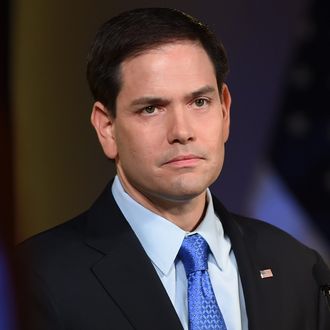
After yesterday’s Super Tuesday contests confirmed the pecking order of Republican presidential candidates, the third-place finisher, Marco Rubio, continued his recent pattern of threats to do everything within his power to stop first-place finisher Donald Trump. Having already crossed the Rubicon (Rubio-con?) by associating himself with the meme #NeverTrump, thereby abrogating his “loyalty pledge” to support the Republican nominee, Rubio’s posturing as a GOP “unity candidate” is more bizarre than ever. Yet he shows no signs of changing course and is now hinting at some sort of monstrous convention cabal to stop Trump if voters refuse to do so. If he fails, then presumably he will take a walk or support an independent or third-party bid, unless the word never has changed its meaning.
Such is the passion for this freshman senator in Republican Establishment and mainstream-media circles that it is taking a long time for the commentariat to realize it’s Rubio, not Trump, who is at present undertaking a hostile takeover bid for control of the GOP. David Graham of The Atlantic registered the surreal nature of Rubio’s Super Tuesday speech in Miami last night:
[W]hen Rubio came out to speak, early in the night, he once again struck the same triumphant pose he has employed time and again, as his campaign finished second or third in contest after contest. “When I am president of the United States, we will not just save the American dream, we will expand it to more people than ever!” he said.
The most telling moment in his speech, however, came a few moments later. “Five days ago, we began to explain to the American people that Donald Trump is a con artist,” Rubio said, alluding to the onslaught of opposition research, insults, and barnyard jokes he has directed at the GOP frontrunner, starting with Thursday’s debate. Why did that take so long, though? It may have been too late to save the Republican Party from Trump, and if it wasn’t, it may have been too late to save Rubio. His case as the Trump alternative depends not on beating Trump outright, but on depriving him of an outright victory with delegates ahead of the Republican convention, then wresting the nomination from him there.
Before he can act on such threats by launching or cooperating in a countercoup on behalf of party elites against party primary voters, Rubio must at the very least win the approbation of a plurality of primary voters in his own state, where his very best recent poll showed him trailing Donald Trump by 16 points. If he loses that winner-take-all contest two weeks from yesterday, even his most avid supporters will have a hard time promoting him as a viable candidate (and the same do-or-die scenario also faces John Kasich in Ohio the same day). The existential threat Florida poses to Rubio means he won’t be wasting any resources in the six states that will choose delegates between now and then, or the five other states that vote on March 15. And so he will enter his crucible even further behind Trump and Cruz, with his protestations of being the obvious choice for the nomination looking more presumptuous — maybe even megalomanic — than ever.
One of the subthemes of this odd presidential cycle has been the oversold idea that party elites can impose their will on sheeplike primary voters whenever they choose. As recently as a couple of weeks ago, Rubio began benefiting from a cascade of elected-official endorsements, and many observers concluded that the party was “deciding” on him as its choice. But unless voters rather than elites quickly consolidate behind a non-Trump candidate, all this talk of fighting the winner of many primaries up to and including the convention could expose the ugly reality that the Establishment is trying to revoke the franchise because they don’t like the results. Nate Silver of FiveThirtyEight said it well today:
[W]e’ve increasingly seen the campaigns, especially Rubio’s and Kasich’s, talk about winning at a contested convention in Cleveland…. [T]he fact that the other campaigns are resorting to drawing up plans for a contested convention has to count as a pretty good sign for Trump. Second, the talk may be premature. As the calendar turns toward states with more aggressive (sometimes winner-take-all) delegate rules — particularly Florida and Ohio on March 15 — it will become easier to rack up a delegate majority even with plurality support. That probably works to Trump’s benefit, although it also means that Cruz or Rubio could rack up quite a few delegates if they “get hot” later on during the campaign.
But the possibility of a contested convention is part of why the notion of a “mandate” is important. If (for instance) Trump has won 37 of 50 states, and 49.9 percent of delegates going into the convention, then technically Republicans might be able to deny him the nomination. For that matter, technically they’d be able to deny Trump the nomination even if he had a delegate majority by changing the rules at the last minute. But the cure might be worse than the disease. It could look as though Republican elites were overriding their voters’ popular will (because, uh, that’s pretty much what they’d be doing). It might even be a casus belli for Trumpism. Even if some Republicans thought it was essential to prevent Trump from winning the presidency, there could be better means to accomplish that, especially by forming a conservative third-party ticket.
If Rubio and his friends decide that either bossing a convention to the “right” result or bailing (as the #NeverTrump meme clearly threatens) on the GOP altogether are where their current efforts are heading, then the rest of us should stop treating Trump as the guy who is elevating his ego and ambition above his party’s prospects for ultimate victory. In what may be turning into a fight between elites and voters, in November the voters will have the final word.






























